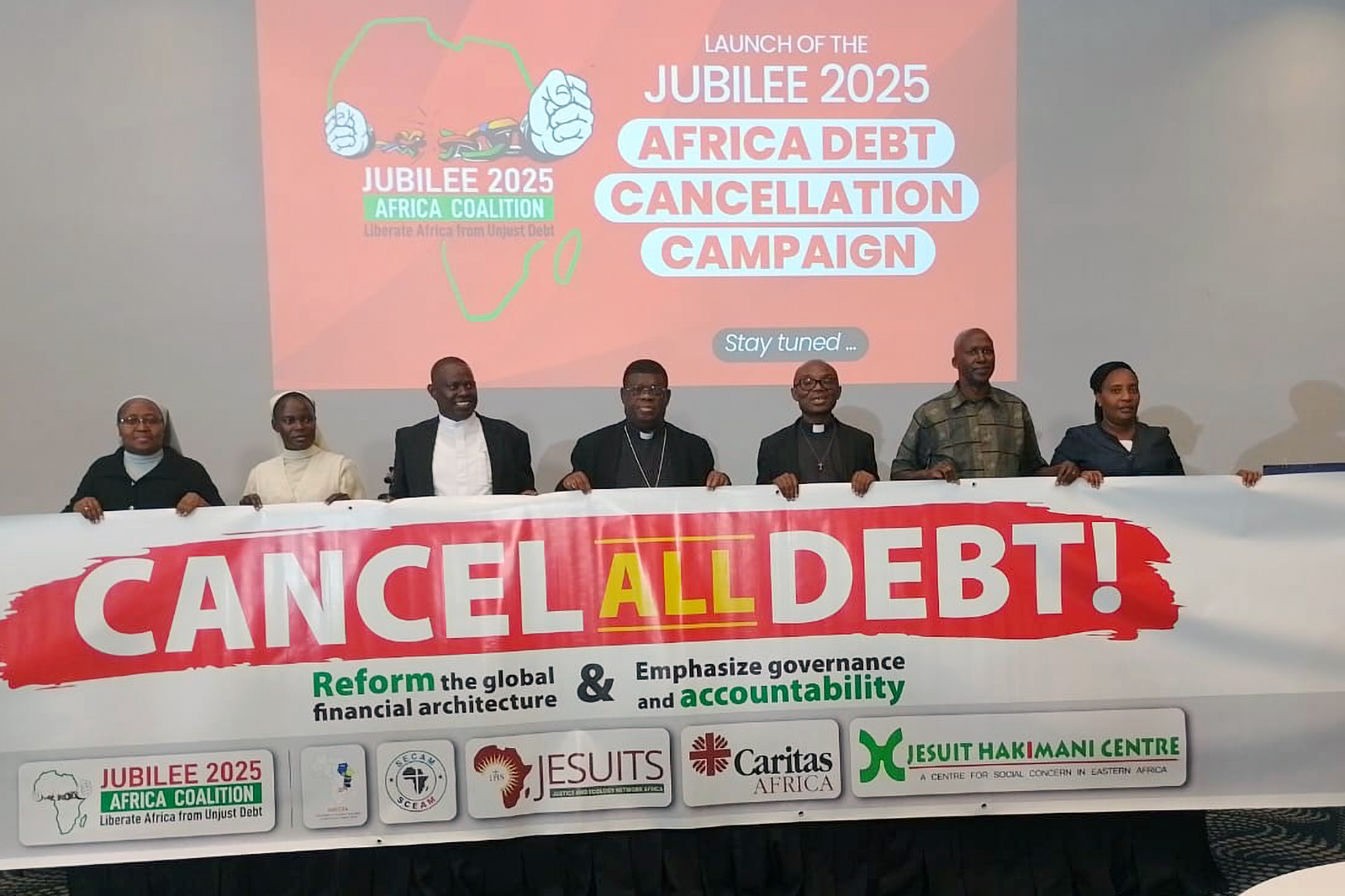
NAIROBI, Kenya (RNS) — Catholic leaders in East Africa launched a campaign on Wednesday (Feb. 12) to advocate for the cancellation of ballooning foreign debts stagnating the countries’ economic development and contributing to poverty.
The Jubilee 2025 Debt Cancellation campaign is inspired by Pope Francis’ declaration of 2025 as the Jubilee Holy Year with the theme Pilgrims of Hope. The campaign was created by the Jubilee 2025 Africa Coalition, a movement involving faith-based organizations, civil society groups, economists and policymakers to demand debt cancellation, global financial reforms and financial accountability for Africa.
Late last year, the Pope invited Catholic bishops all over the world to lobby their governments for debt cancellation. He also asked wealthy countries and institutions to reduce or cancel debt in the name of justice amid the jubilee theme.
“Our mission extends beyond debt cancellation. We seek comprehensive global financial reforms aimed at preventing the cycle of debt entrapment that have plagued our nations,” Zambian Catholic Bishop Charles Kasonde of Solwezi, the president of the Association of Member Episcopal Conferences in Eastern Africa, said at a news conference Feb. 12 in Nairobi. “We advocate for responsible borrowing and lending practices that uphold justice and equity.”
Africa’s external debt stands at over 1.1 trillion, according to the African Development Bank. Many African countries are spending more than 50% of their revenue to meet debts, crippling their ability to invest in areas such as education and health.
Many countries in the East Africa region face heavy debt burdens threatening their stability.
“Urgent action is required to avert further stagnation and unlock the potential of these economies,” Kasonde said.
According to the coalition, pursuing debt cancellation in the year of jubilee is a historical and moral obligation, stemming from biblical traditions that call for periodic debt forgiveness and the restoration of an economic equilibrium. This system, in turn, provides hope and the possibility of renewal and freedom.
“The debts perpetuate poverty. Some were borrowed without the people’s consent,” said the Rev. Charles Chilufya, the director of Jesuit Justice and Ecology Network Africa.
Twenty-five years ago, the global Jubilee 2000 campaign led by faith and human rights groups helped result in the cancellation of over $100 billion in debt for some of the most indebted countries, according to World Bank. And although that initiative, which the Catholic Church participated in, freed funds for sectors including education, health and infrastructure, the relief wasn’t sufficient to reform flaws within the global financial architecture, Chilufya said.
“It’s all about how the economy of the world is organized. It should be reset and the debts cancelled so that countries can start from a clean slate,” Chilufya said.
Kasonde said the coalition would appeal to the G20 Leaders’ Summit, which is being led by and hosted in South Africa through Nov. 30, 2025. The G20, or Group of Twenty, brings together leaders of major world economies, representing around 85% of the world’s GDP, more than 75% of world trade and around two-thirds of the world’s population.
The G20 Foreign Ministers’ Meeting is scheduled from Feb. 20-21 in Johannesburg, at which the United States — a key player — is expected to be absent. Secretary of State Marco Rubio announced earlier this month the U.S. would boycott the talks, citing South Africa’s “anti-American” agenda.
Civil society groups in Africa have criticized the U.S. move as undermining global attempts to tackle pressing challenges.
“This decision is disappointing and regrettable. Africa is not a passive player in global affairs, and dismissing its role in critical platforms like the G20 only deepens existing inequalities,” said Mithika Mwenda, executive director of Pan African Climate Justice Alliance, in a Feb. 10 statement.
Still, Kasonde said the coalition would continue to pursue foreign debt relief through various avenues.
“We shall knock on the doors of G7. We shall knock on the doors of the IMF, World Bank and the eastern area of China and related countries, so that we walk together and we help make a difference for Africa,” Kasonde said in response to a question from RNS.
The Rev. Fr. Paul Mung’athia Igweta, coordinator of the Department of Integral Human Development at the AMECEA, also spoke at the press conference about the impact of President Donald Trump’s efforts to end the U.S. Agency for International Development’s foreign aid. USAID’s dismantling would stall or end programs serving already strained African economies.
“Trump became very popular because his policies were aligning a lot with what the church stands for, (but) his (directives) have brought a lot of ripple effects on our continent,” the priest said. “For now, it’s a setback for debt cancellation since some of the orders will cause a decline of African economies.”
And as the coalition pushes its mission, it also seeks to consider strategies for recovery, debt restructuring to ease payments and fairer borrowing terms to ensure sustainability.
“Once it becomes a global agenda, it’s easier for us to win,” Igweta said.
